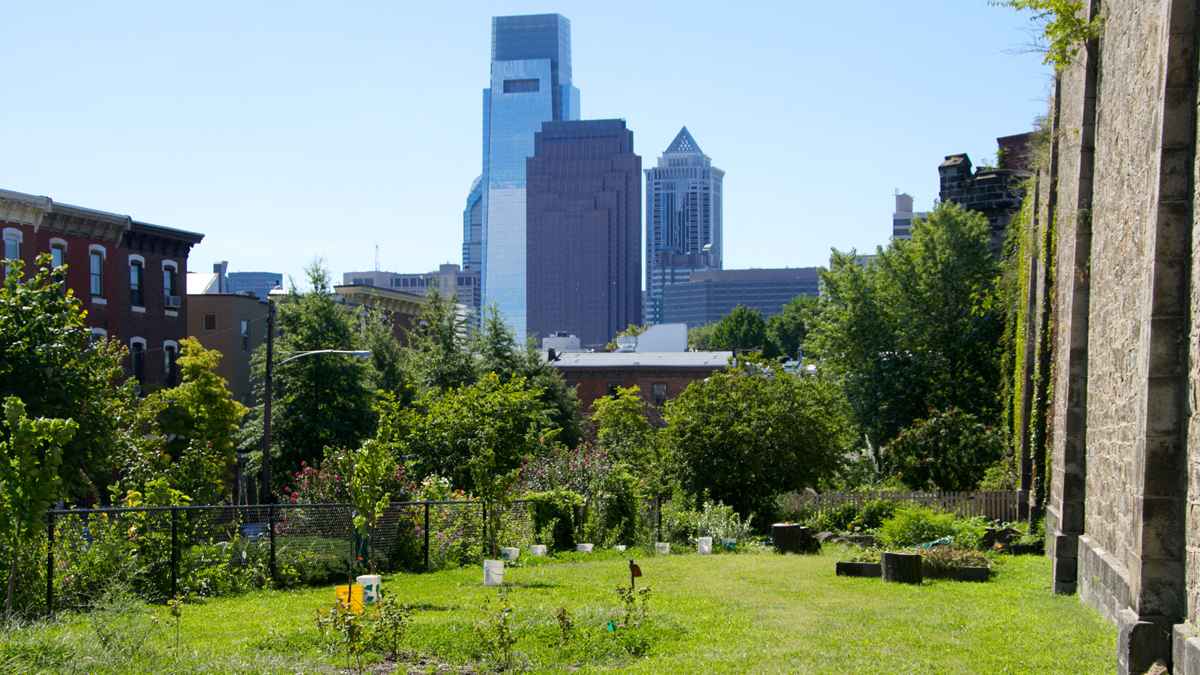Philly should prioritize fair neighborhood development, more green space
Philadelphia needs to be a town that is both affordable and well developed; everyone deserves to live in a neighborhood that meets their needs within their financial capacity.

This stretch of green along the Corinthian Avenue side of Eastern State Penitentiary has since been developed into a park called Corinthian Gardens. (Nathaniel Hamilton/for NewsWorks, file)
Speak Easy is examining issues of neighborhood development in Philadelphia. How can city leaders help us achieve a fair future for long-term residents and newcomers alike? The following submission comes from an attendee of the April 21 public forum “Philadelphia Neighborhoods in Flux.” We are seeking diverse perspectives on these issues. Submit your own commentary to Speak Easy by emailing it to speakeasy@whyy.org.
—
Philadelphia needs to be a town that is both affordable and well developed; everyone deserves to live in a neighborhood that meets their needs within their financial capacity. We must not only find ways to not displace long-time residents, we also need to preserve green space and foster urban agriculture.
That’s why East Park Revitalization Alliance and a compassion team formed in Circle of Hope have joined many of the city’s leading community, disability, faith, labor, and urban agriculture organizations in the recently formed Philadelphia Coalition for Affordable Communities (PCAC). The coalition’s “Development without Displacement” campaign aims to expand and protect affordability in neighborhoods undergoing gentrification.
Neighborhood development plans often undervalue the creation and preservation of urban green space. PCAC believes that urban green space is a vital component of healthy neighborhoods, providing environmental, aesthetic, recreational, public health and ecological benefits. Green spaces, such as parks and community gardens, also foster interaction between neighborhood residents and can be used as outdoor learning spaces. All Philadelphians, especially marginalized communities, should have access to green spaces and the many benefits they provide.
Philadelphia has the potential to be a national leader in urban greening. We already have a thriving urban agriculture movement with many organizations working to increase access to fresh, sustainably grown food and to raise awareness about the links between diet and health. The Green2015 initiative has outlined a strategy to add 500 acres of new publicly accessible green space to the city by 2015.
One way that we can spread the benefits of green space and urban agriculture to all neighborhoods is by expanding the capacity of the Philadelphia Housing Trust Fund. Over the last 10 years, the Trust Fund has dedicated 50 percent of its proceeds toward improving housing options for families earning less than $20,000 per year and has so far provided housing opportunities to more than 14,000 low- and moderate-income families, seniors, people with disabilities and homeless people. Additional funding can support more individuals and projects to build healthier, more inclusive communities for future generations.
PCAC is calling for a 1.5 percent anti-speculation tax on “flipped” properties — defined as those that are bought and then sold within a 24-month period. Research shows that in 2013 more than 6,000 real estate transactions in Philadelphia fit that description for an estimated total value of $782 million. This small fee on what is a lucrative practice can generate an additional $12 million to support the Fund without raising taxes or fees for a large majority of residents.
Putting $12 million in the Philadelphia Housing Trust Fund has the power to create newly constructed affordable rental apartments, support existing homeowners who seek critical home repairs and modifications to assist those with disabilities, stabilize households facing homelessness, and provide grants for capital improvements and infrastructure for community gardens and food-producing green spaces.
The issue of gentrification is polarizing and has produced a heated public policy debate. Long-time residents, many of whom are low-income, are fearful of being forced out of their neighborhoods by rising property values and taxes. Real estate developers feel that they are improving the neighborhood and increasing the city’s tax base. Arguably both sides want healthy communities for current and future generations to thrive in. We believe that public policy can, and should, incentivize equitable community development where positive changes occur, while the interests of the disenfranchised are protected.
So if you believe, as we do, that Philadelphia can be a great and affordable place to live, and if you support our vision for equitable, healthier community development, we encourage you to consider joining our coalition and supporting changes — like the anti-speculation tax — that help ensure development without displacement.
—
Suku John is executive director of the East Park Revitalization Alliance. Jonny Rashid is the pastor for Circle of Hope. Both are steering committee members of the Philadelphia Coalition for Affordable Communities.
WHYY is your source for fact-based, in-depth journalism and information. As a nonprofit organization, we rely on financial support from readers like you. Please give today.


